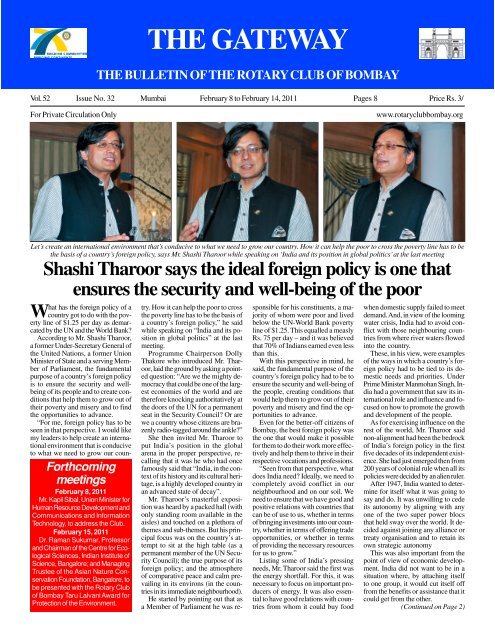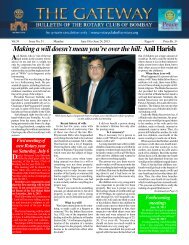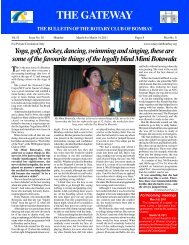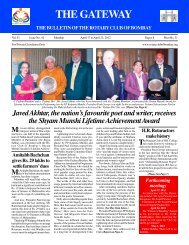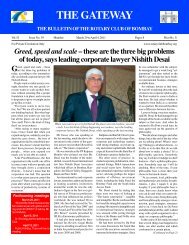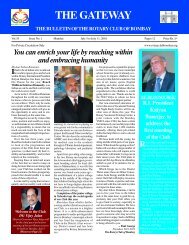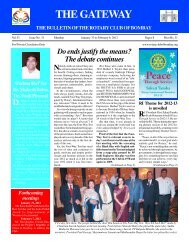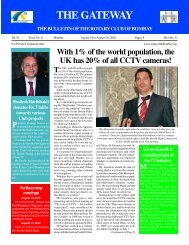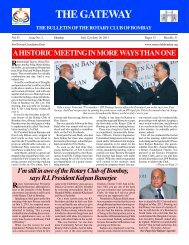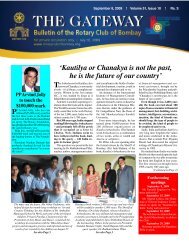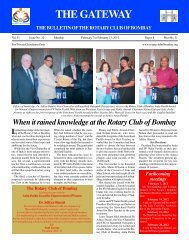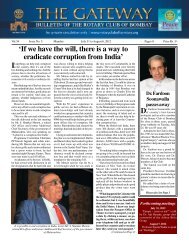Gateway 080211.pmd - Rotary Club of Bombay
Gateway 080211.pmd - Rotary Club of Bombay
Gateway 080211.pmd - Rotary Club of Bombay
- No tags were found...
Create successful ePaper yourself
Turn your PDF publications into a flip-book with our unique Google optimized e-Paper software.
With two gentlemen who have served the country abroad with distinction. Third from left is Mr. Shashi Tharoor, aformer Under-Secretary General <strong>of</strong> the UN. And at left is Mr. Prakash Shah, who has served as India’s Ambassadorin Japan and Venezuela, as High Commissioner to Malaysia and as India’s former Permanent Representativeto the United Nations, both in New York and in Geneva. While Mr. Tharoor was the guest speaker at the lastmeeting, Ambassador Shah was a guest <strong>of</strong> the <strong>Club</strong>. Others in the picture are Dolly Thakore, President PradeepSaxena, Ms Sunanda Tharoor, President-Elect Paul George and Vice-President Nowroze VazifdarDr. Raman Sukumar to speakon February 15Dr. Raman Sukumar, Pr<strong>of</strong>essorand Chairman <strong>of</strong> the Centre forEcological Sciences, Indian Institute<strong>of</strong> Science, Bangalore; and ManagingTrustee <strong>of</strong> the Asian Nature ConservationFoundation, Bangalore, will beRs. 1 lakh forPETA, Rs. 25,000for straysTara Deshpande, daughter <strong>of</strong>Leela Deshpande, has made adonation <strong>of</strong> Rs. 1 lakh towardsPETA’s animal rehabilitation programme.President Pradeep Saxena announcedat the last meeting that Tarahad also made another contribution<strong>of</strong> Rs. 25,000 for the welfare <strong>of</strong>strays.He thanked Tara for her thoughtfulmunificence.Jalaj Dani givesRs. 1 lakh for‘Bhavishya-Yaan’presented with the <strong>Rotary</strong> <strong>Club</strong> <strong>of</strong><strong>Bombay</strong> Taru Lalvani Award for Protection<strong>of</strong> the Environment at themeeting <strong>of</strong> February 15. He will addressthe <strong>Club</strong> subsequently.A specialist in wildlife ecology,tropical forest ecology and the impact<strong>of</strong> climate change on forests andbiodiversity, Dr. Sukumar has donepioneering work on issues concerningwildlife-human conflicts (withspecial emphasis on elephants), anarea <strong>of</strong> increasing concern and importanceacross the country.Dr. Sukumar, who has authoredseveral books, has worked extensivelyin the Nilgiris, in Kaziranga and inMyanmar. His path-breaking workin the Nilgiris includes surveying anddesigning India’s first biosphere reserveover an area <strong>of</strong> 5,500 squarekm.Congratulations!President Pradeep Saxena led the<strong>Club</strong> in applauding IPP NandanDamani for the outstanding performance<strong>of</strong> his team during the last<strong>Rotary</strong> year, 2009-2010.He pointed out that the <strong>Club</strong> hadbeen awarded six District Trophies,11 Gold Certificates and one SilverCertificate at the annual DistrictConference which was held on January29 and 30.BirthdaydonationsDhananjaya Mehta has made abirthday donation <strong>of</strong> Rs. 10,000and Parvesh Mehra <strong>of</strong> Rs. 2,500.President Pradeep Saxena announcedthe receipt <strong>of</strong> these contributionsat the last meeting andthanked both donors for their generosity.At the last meeting(Held on February 1, 2011)PRESIDENT Pradeep Saxenacalled the meeting to order andwelcomed the guest speaker, theVisiting Rotarians, <strong>Rotary</strong>anns,guests and others.BIRTHDAYSMembers and spouses celebratingtheir birthday during the week werefelicitated.ATTENDANCEMembers 183Visiting Rotarians 9Spouses/<strong>Rotary</strong>anns 9Guests 7Total 208Svc. box collection Rs. 7,000Terry Fox Run onFebruary 27The 13th annual Terry Fox run willbe conducted along the iconicMarine Drive in <strong>Bombay</strong> on Sunday,February 27, to raise funds for researchon cancer among children. The Governor<strong>of</strong> Maharashtra has consentedto be the chief guest on the occasion.According to Fellowship ChairpersonShernaz Vakil, who is assisting inorganising the event along with theTerry Fox (India) Committee, the <strong>Rotary</strong><strong>Club</strong> <strong>of</strong> <strong>Bombay</strong> and the OberoiHotels group, the funds garnered willbe utilised for research at the Tata MemorialCentre.Organised in <strong>Bombay</strong> under theleadership <strong>of</strong> PP Gul Kripalani, theTerry Fox Run has become an importantdate on the city’s philanthropiccalendar.Following the “Run” will be theusual brunch, which is also a fundraiserand invariably a sumptuous affair,at the Trident Hotel <strong>of</strong> the OberoiGroup. It will begin at 12 noon and islikely to end around 3 pm.Donor cards for the brunch havebeen priced at Rs. 2,500 for adultsand Rs. 1,250 for children aged between6 and 12 years. No charges willbe levied for children below 6.The corpus <strong>of</strong> the Bhavishya-Yaan project has been boostedwith a contribution <strong>of</strong> Rs. 1 lakhreceived from Jalaj Dani.President Pradeep Saxenathanked Jalaj at the last meeting forhis generosity.Further, he added, a donation <strong>of</strong>Rs. 10,000 had been received fromMadhusudan Daga to meet the runningexpenses <strong>of</strong> the Bhavishya- Meeting the leaders <strong>of</strong> tomorrow. Mr. Shashi Tharoor snapped with Dolly Thakore and Rotaractors at the lastYaan project.meeting. At right, he and his spouse interact with P.K. Mohankumar. In the centre is Alok SekhsariaFebruary 8 to February 14, 2011 THE GATEWAY, The Bulletin <strong>of</strong> the <strong>Rotary</strong> <strong>Club</strong> <strong>of</strong> <strong>Bombay</strong> Page 3
WHEN THE PREBEAT THE ‘BHAVLining up before the match for the introductions(above). Played in true sporting spirit, thegentleman’s game had the players turning out inall whites on the morning <strong>of</strong> January 22.They were formally introduced to PresidentPradeep SaxenaThere was more action beyond the boundary Akshay Ramchandra Kharat from the Colabaropes at the festive cricket match between the centre was the Captain.<strong>Rotary</strong> <strong>Club</strong> <strong>of</strong> <strong>Bombay</strong> President’s XI and theBhavishya-Yaan XI at the scenic P.J. HinduSoon, another set <strong>of</strong> rival teams was formed.While one consisted <strong>of</strong> members who supportedGymkhana on Marine Drive on January 22. the <strong>Rotary</strong> XI, the other one had come prepared toLeading the winning team back to the pavilion. Although Sports Chairman Moy Biswas was vociferously support the Bhavishya-Yaan XI lestHoshang Nazir, who took four wickets, leads the the first to arrive, all 27 players (12 from the <strong>Club</strong> the boys felt the absence <strong>of</strong> voices supporting them.team back to the pavilion. At left is Mohankumar and 15 from Bhavishya-Yaan) made it to the ground The match was arranged by the Sports Committeelong before 8.30 am. Interested members trickled insoon after and then the fun and games started.As the guffaws over some sporting jokes rangout loud and clear, Captain Deepak Kapadia (whois a member <strong>of</strong> the Hindu Gymkhana) invited theteam to enjoy some snacks and tea.Promptly, and as if on cue, a line <strong>of</strong> youngsters –who turned out to be members <strong>of</strong> the Bhavishya-Yaan XI – ran a brisk lap <strong>of</strong> the ground.The snacks remained suspended in mid-air andsome awkward questions were raised. “Who arein association with the Education forAll Committee, which has Alok Sekhsaria asChairman.The captains went out to the centre for the toss,with President Pradeep spinning the coin. TheBhavishya-Yaan captain called correctly and askedthe President’s XI to bat. “That’s exactly what wewanted,” said a team member. “Just you wait,” saidanother, “the pitch is wet with overnight dew andthe bowlers will give you some chin music.”Something fishy happened after that. SomeoneAt the end <strong>of</strong> the match, President Pradeep those boys? Don’t tell me they are our competitors?Good Lord! They’re all limbering up and get-snacks specially served up for them. Snacks justinvited the Bhavishya-Yaan team to partake <strong>of</strong>presented memento to all the players. Here he iswith the rival captain, Akshay Kharat ting charged for the match and here we are gorging before taking the field in a cricket match? Did iton batata-wadas! We’re done for it!”Some wadas were reluctantly put back on emptyplates and glasses <strong>of</strong> sweet chai quietly placed onthe table. But the message had been conveyed. Theboys were getting ready for the fight.Were all the President’s men going to be up to it?We’ll beat them, said an unconvincing voice. They’rejust little boys, responded another. Hope yourbones, joints and muscles don’t let you down, saidsmack <strong>of</strong> sabotage? What would the boys do on thefield all those snacks inside them?To cut a long story short, the match started alittle after 10 am by which time the sun was shininghard and bright, quickly drying up the slipperyoutfield. The Hindu Gymkhana lent its pair <strong>of</strong>umpires and Mr. Eruch Irani and Mr. Anmol Purohitsettled down with the scorebook.In a scene reminiscent <strong>of</strong> the first over bowleda third.by Zaheer Khan in the World Cup Final againstThe match was won by the President’s XI, but the By the time the game ends, said the wise one, Australia in 2007, the very first over was full <strong>of</strong>real victor was the spirit <strong>of</strong> brotherhood and you’ll rediscover several aching bones and muscles wide balls. Zaheer had bowled five wide balls, butFellowship that the match fostered which you had forgotten existed in your body. the Bhavishya-Yaan youngster bowled eight. TalkThe Hindu Gymkhana presented gifts to the‘Bhavishya-Yaan’ team, thanks to DeepakKapadia (right)Suitably chastised, the President’s men consumedthe first round <strong>of</strong> tea – and just then the bearersreappeared with another set <strong>of</strong> dishes. But the cricketersin the team did not stay on to relish the secondcourse. Most <strong>of</strong> them went out to the playingarea and started practising.Soon, it was time for the President to be introducedto the rival teams. Moy and Deepak did thehonours for the <strong>Rotary</strong> team.The 15 youngsters from the rival team were introducedby their coordinators, viz., Bijal Kara,Nandita Patodia and Sandeep and Soma Dasgupta.Five boys each had been chosen from the Bhavishya-Yaan centres at Byculla, Colaba and Worli.<strong>of</strong> big match jitters!Opening batsmen Vipul Ambani and Sohil Shahfound it rather difficult to connect, what with theball passing them at a distance <strong>of</strong> two feet.But Sohil (brother-in-law <strong>of</strong> Anand Dalal)quickly found his bearings and started smashingthe ball all around the field. He finally emerged asthe highest scorer for the team and provided theinitial impetus that saw it race <strong>of</strong>f to a score <strong>of</strong> 100in just under 10 overs.Other batsmen who did well for the President’sXI were Ashwin Thakkar, Mohankumar, RahulPunjabi and Sharan Daswani (the latter two fromthe SIFE <strong>of</strong> H.R. College). Also in the team wereFebruary 8 to February 14, 2011 THE GATEWAY, The Bulletin <strong>of</strong> the <strong>Rotary</strong> <strong>Club</strong> <strong>of</strong> <strong>Bombay</strong> Page 4
SIDENT’S MENISHYA-YAAN’ XIA group photograph (left) taken at 9 am on acold, sultry morning at P.J. Hindu Gymkhanaalong Marine Drive when a festive cricket matchwas played between the <strong>Rotary</strong> <strong>Club</strong> <strong>of</strong> <strong>Bombay</strong>President’s XI (above) and a ‘Bhavishya-Yaan’ XI(drawn from three schools)Hoshang Nazir, Abhiram Sheth, Pradeep Gupta andMr. Irani.But above all there was President-Elect PaulGeorge, who smacked the ball hard a couple <strong>of</strong>nounced blush that was visible from the other side<strong>of</strong> the field.Several members dropped in to view the proceedingsand cheer the players at their convenience.times and also ran some quick singles. It was in the Among them were Jaidev Merchant, Nowrozeprocess <strong>of</strong> stealing a cheeky one that he fell flat on Vazifdar, Nirav Shah, Sitaram Shah, PP Arun Sanghi, The President’s XI lost the toss and was put in tohis face and had to be helped back into the pavilion Shiv Kumar Israni, Bipin Kapadia, PP Vithal Palekar bat. Captain Deepak Kapadia briefs Paul Georgefor some quick first aid. Home comes the warrior and Homi Katgara.as Sports Chairman Moy looks on at leftfrom the front, said the wise one.But Paul got away with just a few bruises and aminor cut or two. Of course, he broke his wiryspectacle frame and had blood on the front <strong>of</strong> his T-shirt, but he was intact and in one piece at the end<strong>of</strong> the match. (He confessed later that evening thathe was chastised by his wife for the broken spectaclesand by his daughter for attempting to steal acheeky single.)The President’s XI scored a total <strong>of</strong> 177 runs inthe allotted 20 overs (with Mr. Extras topping theWhen it was time for the Bhavishya-Yaan teamto chase the 178 required for victory, Rahul andSharan opened the attack. But the honours werewon by Hoshang Nazir who claimed four wicketsin an inspiring spell <strong>of</strong> bowling. Other bowlers whodid well were Sohil and Mr. Irani (who was spottedat one time sitting on a chair inside the boundaryline). Vipul Advani kept the wickets admirably well.Needless to say, the boys from Bhavishya-Yaancould not reach the rather stiff target set for them.They lost by 32 runs but they fought till the lastscore at 44) and set a target <strong>of</strong> 178 for their rivals. ball was bowled.They cheered for the ‘Bhavishya-Yaan’ team.And now a few words about the goings-on in the Jayprakash Chauhan <strong>of</strong> the Colaba school was From right, Bijal Kara, Suma Dasgupta,pavilion.the highest scorer and gave a brilliant all-round display,whether bowling, batting or fielding. Bipin Dalal and Madhusudan DagaDhvanika Thakkar, Nandita Patodia, AnandEvery time the boys <strong>of</strong> the Bhavishya-Yaan teamappealed to the umpire, their supporters also rosein support, demanding that the batsman be declaredout! They were led by Ramesh Narayan, AlokSekhsaria, Madhusudan Daga, Manojj Patodia andSandeep Dasgupta and were ably supported byBijal, Nandita and Soma.Also rooting for them were computer teachersAmit Hatankar and Rukhsana, Ms Neeta Pradhan<strong>of</strong> the NGO “Vidya” and the Principals <strong>of</strong> theShukla <strong>of</strong> the Worli school kept the wickets and dida very good job.President Pradeep presented mementoes to allthe players after the match, before they went intothe pavilion for lunch. After a healthy meal, Deepakrequested Moy to present gifts to the Bhavishya-Yaan team on behalf <strong>of</strong> the Hindu Gymkhana.The Sports Committee arranged white flannelsand cricketing gear to the Bhavishya-Yaan teamByculla and Colaba Municipal Schools who also which consisted <strong>of</strong> the following players:turned up to cheer their boys along with Ms Akshay Ramchandra Kharat (Captain), Moy watches the match in the company <strong>of</strong> PaulPratibha Pai <strong>of</strong> H.R. College and its SIFE (which Jayprakash Ramprakash Chauhan, Dashrath George and PP Vithal Palekarhas been working with the students at the WorliBhavishya-Yaan).Manojj wondered why the umpires were notdeclaring the batsmen out. Had they been fixed? Noway, said Mr. Irani. But I heard that the coin usedfor the toss was a double-header (it had “heads” onboth sides), said someone. “So even the toss wasfixed, was it?” asked the wise one.But it was a delight to see the leading lights <strong>of</strong> theBhavishya-Yaan project rooting for their team. Thebanter made it really worth the while.Shivshankar Kanojiya, Avinash Madhukar Ghevadeand Jagrut Ganesh Jadhav (all from the Colabaschool); Mohd. Irfan Sabir Ansari, Pankaj SureshJaiswar, Bipin Dinesh Shukla, Shravan Pandey andVishal Baban Jadhav (from Worli); and ShahidHussain Ansari, Mohd. Sameer Amir Khan, VishalAnil Dhagate, Shrirang Namdev Renuse and KailashVithal Chanduskar (Byculla).The <strong>Rotary</strong> <strong>Club</strong> <strong>of</strong> <strong>Bombay</strong> President’s XI wasrepresented by Deepak Kapadia (Captain), AshwinThakkar, Eruch Irani, Hoshang Nazir, AbhiramWhen the normally staid Ramesh shouted “Well Sheth, P.K. Mohankumar, Vipul Ambani, Sohil Mr. Eruch Irani waves a flag to inform thefielded!” Mr. Purohit chipped in with a plaintive Shah, Pradeep Gupta, Rahul Punjabi, Sharan umpire that his signal has been seen. Helping him“Et tu, Ramesh!” Ramesh’s response was a pro-Daswani and Paul George.keep the score is Mr. Anmol Purohit (left)February 8 to February 14, 2011 THE GATEWAY, The Bulletin <strong>of</strong> the <strong>Rotary</strong> <strong>Club</strong> <strong>of</strong> <strong>Bombay</strong> Page 5
Diplomacy had played a key role in preventing furtherattacks after 26/11, claims Shashi Tharoor(Continued from Page 2)Returning to the theme that he hadset out with, that is, the security andprosperity <strong>of</strong> its people, Mr. Tharoorsaid India’s biggest external menaceremained the export <strong>of</strong> terrorism froma neighbouring country.In the aftermath <strong>of</strong> the horrificevents <strong>of</strong> 26/11, he said, the governmenthad been wise in not heedingimpetuous calls for some kind <strong>of</strong> retaliatorystrike on Pakistan. Thatwould at best have destroyed a fewtraining camps which would havebeen reassembled in a matter <strong>of</strong>weeks. But it would have had a farmore calamitous impact on the Indianeconomy.“Investors don’t want to come intoa war zone. And we, as I said earlier,should be far more concerned aboutour economic well-being than aboutthe momentary gratification <strong>of</strong> hittingan elusive target in a neighbouringcountry.”On the other hand, India had shownits diplomatic resolve by turning onthe heat by all available means,whether at the UN, in its sanctionscommittee and its counter-terrorismcommittee, or through bilateral relationswith Pakistan’s biggest ally, theUnited States. India had, indeed,turned the heat on Pakistan.There had been no attack since 26/11, save the blasts at the German bakeryin Pune which appeared to be aone-<strong>of</strong>f thing not planned on the scale<strong>of</strong> 26/11. Thus, diplomacy had playeda key role in preventing further attacksby making it clear that the price forPakistan <strong>of</strong> condoning or permittingsuch attacks would be an extremelyhigh one to pay internationally.Mr. Tharoor said India’s “toughneighbourhood” appeared more reasonablethan it had been a few yearsago. Sri Lanka, which had been in thethroes <strong>of</strong> bitter strife, had seen theend <strong>of</strong> its civil war. Bangladesh, whichwas faced with a military coup, hadhad a democratic election, the return<strong>of</strong> the army to its barracks and theinstallation <strong>of</strong> a government sympatheticto India.In the Maldives, where an unpopularPresident had jailed his opponent,a free election had seen thejailed person being sworn in as President.Nepal was confronted with aMaoist insurrection, but things hadcooled down. Although it was not yetstrife-free, there had been no revival<strong>of</strong> violence and India was playing anactive role in trying to ensure a seamlesstransition to full-fledged normalcy,with the Maoists accommodatedwithin the political structure.To the north, Afghanistan had seenanother election, albeit a contestedone, but it seemed that the developmentworks India had done there hadnot gone unappreciated.“Our only problem remains withPakistan and that’s an indefinite problem.Our foreign policy will have totake this fundamental reality into account,that there are at best going to bespasms <strong>of</strong> uneasy peace between us –a cold peace; it’s never going to beparticularly pleasant because we haveone fundamental conundrum, the differencebetween our two societies.“In India, the state has an army, inPakistan, the army has a state. Andthe army in Pakistan commands agreater share <strong>of</strong> national resourcesthan any army. They expend a largerpercentage <strong>of</strong> the country’s GDP thanany army in the world. You don’tjoin the army in Pakistan to defendthe country, you join it to run thecountry.“Not only has the army controlledthe government for 32 out <strong>of</strong> 63 yearssince independence, but during theremaining 31 years it has been pullingthe strings, drawing the red lines,telling the civilian governments howfar they can or cannot go. Not onecivilian government in the history <strong>of</strong>Pakistan has completed a term <strong>of</strong> <strong>of</strong>ficebecause the military has alwaysstepped in to take back the reins <strong>of</strong>power.”Mr. Tharoor pointed out that Pakistanisociety was run by the militarywhich was so comfortably ensconcedthat it was unlikely to everdesire peace or normal relations withIndia – unless that country’s societychanged so fundamentally that itsmilitary was firmly put in place.But that was a pipedream. Electedgovernments lived in constant fear <strong>of</strong>the army which always got its way.The best India could hope for was acold peace, something it would be ableto manage with its diplomatic skills.Turning to China, Mr. Tharoor saidthe media <strong>of</strong>ten propagated worryingstories about developments on theborder, China’s claims on ArunachalPradesh and the bellicose statementsmade by the Chinese.India had a long, unresolved borderdispute which could have beensettled under Deng Xiao-Ping, but thethen Indian leadership was not confidentthat it would be able to sell thesettlement to the people. Today’sleadership was prepared to settle thedispute, but China did not appear tobe keen. Perhaps it wanted to retainit as an issue with which to occasionallyharangue India.The “incidents” highlighted by themedia were not really serious. Chinacontinued to maintain its claims toArunachal Pradesh, but India hadstood its ground. It had conductedelections in Arunachal Pradesh; thePrime Minister had visited and campaignedin the State; and the DalaiLama, despite dire Chinese warnings,had also gone there. India had stoodfirm, without being too belligerent,about its sovereign rights over its territory.That was not going to change.In the meanwhile, said Dr. Tharoor,trade had grown to $51 billion in thelast financial year and could touch $60billion this year. Although the balance<strong>of</strong> trade was overwhelmingly in China’sfavour, India was pushing away at thenon-tariff barriers that made it difficultfor Indians and Indian companiesto access Chinese markets.Many Chinese companies werebidding for power, construction andother projects in India. There were7,000 Indian students in China andtheir number was growing. The annualpilgrimage to Kailash andMansarovar in China was a success.What was lacking was a steady flowinto India <strong>of</strong> Chinese tourists whowere doing wonders for the economies<strong>of</strong> Thailand and Singapore.“I think we must encourage moreChinese investments in India, becausethe higher the stake that China has inthe success <strong>of</strong> the Indian economy,the less likely it is that somebody inBeijing will say or do things that willdisrupt the growth or success <strong>of</strong> oureconomy.“So, I come back to the economy...India has become a force to reckonwith in the world. There are not toomany countries which have received<strong>of</strong>ficial visits from the Presidents orPrime Ministers <strong>of</strong> all five permanentmembers <strong>of</strong> the UN SecurityCouncil in one calendar year, as wedid last year. That attention, that respect,is going to ensure that we continueto make the kind <strong>of</strong> impact thatwe are capable <strong>of</strong> making in the world.“The India that I believe in and Iam proud to have come back to serve,is an India that should be unafraid <strong>of</strong>the prowess or the products <strong>of</strong> theoutside world; that is confident aboutits place in the world and about itsneed to liberate the creative energies<strong>of</strong> its own people; to give them opportunitiesto advance, to build decentlives for themselves, and at thesame time to set an example in ourneighbourhood and elsewhere for thesuccessful, democratic management<strong>of</strong> diversity which is something thatI believe we are doing effectively,”Mr. Tharoor concluded.Answering questions, he told PPArvind Jolly that the rebellious developmentsin Tunisia and Egypt werethe result <strong>of</strong> authoritarian rule compoundedby economic failure. This wasa virus that bore ominous portents forall countries, especially in the Arabworld where “sclerotic regimes” hadrefused to change for several decadesand which had failed to maintain theirconcord with the people.Other countries that could facesimilar problems were Yemen,Libya, Jordan and Sudan (where thesouth had already voted overwhelminglyin a referendum to part fromthe North).Mr. Tharoor said the fears expressedby the West about the existingArab regimes being supplanted byIslamist extremists were unfounded.The “voices <strong>of</strong> the opposition”emerging in Egypt (in the shape <strong>of</strong>ElBaradei) and Tunisia were as moderateas the Islamist parties rulingTurkey.He also answered questions posedby Shailesh Haribhakti, Dr. ShaileshRaina, Dr. Aashish Contractor, PDGManibhai Doshi, Pr<strong>of</strong>. Rohini Chowgule,two Rotaractors and two VisitingRotarians.Mr. Tharoor assailed as a shameful,craven act the episode <strong>of</strong> 1999when India released terrorists in orderto save the hostages hijacked toKandahar in Afghanistan.What got his goat was the factthat the then Foreign Minister hadgone on the flight that carried thereleased terrorists to (and whichbrought back the hostages from)Afghanistan. He decried the middleclass “vote bank” politics behind thedecision to release the terrorists tosave the hostages.He lauded the act <strong>of</strong> the Indiangovernment in sending troops to helpput down an attempted coup in theMaldives in 1995. The then President(who had been ousted recently)was a reliable friend <strong>of</strong> India. Withinhours, India flew in paratroopers whoattacked the coup leaders, took overthe country and handed it back to thelegitimate authorities.(Continued on Page 7)February 8 to February 14, 2011 THE GATEWAY, The Bulletin <strong>of</strong> the <strong>Rotary</strong> <strong>Club</strong> <strong>of</strong> <strong>Bombay</strong> Page 6
‘The Pakistani army, which has a vested interest in sustainingenmity with India, will never allow peace efforts to succeed’(Continued from Page 6)“No one else could have done thatsort <strong>of</strong> decisive, swift intervention...We had the capacity and the will andwe did it. And that showed that weare also able to act with decisivenessin the rest <strong>of</strong> the world. I would saythat on balance we have good and badexamples to show. If we look to thefuture and not the past, we shouldnow concentrate only on creatinggood examples.”Mr. Tharoor was engaged in a dialogueby Dr. Shailesh Raina over theneed, the role and the success <strong>of</strong>India’s UN peace-keeping forces, especiallyin Sri Lanka.Although the force sent to SriLanka was called Indian Peace-KeepingForce, it was not a UN force butan Indian military intervention, hesaid. It was called a peace-keepingforce because India wanted to keepthe peace that had been negotiatedbetween the government and theTamils. India had decided that in orderto keep the peace, she would alsobe prepared to enforce the peace. Butthe Indian force got involved in ashooting war when the LTTE violatedthe peace.“You can’t really mix up that episode,which was, in the end, a fullfledgedshooting war, with normalpeace-keeping activities which rarelyinvolve the kind <strong>of</strong> loss <strong>of</strong> life thatoccurred in Sri Lanka.“As far as UN peace-keeping missionsare concerned, there have beensome successes and some failures.The ones that have succeeded are theones <strong>of</strong> the classic inter-position nature,where they come between twohostile forces and separate them. Wehave done very well in those, especiallyin Egypt, Sinai and so on.“UN peace-keeping operationshave not succeeded when either theworld has been divided or when themission has simply not been (given)the resources commensurate with themission and when the soldiers arethere marking time.”Listing the benefits <strong>of</strong> peace-keepingforces, Mr. Tharoor said the use<strong>of</strong> the military capacities <strong>of</strong> countriesthat had no direct stake in a conflictreduced the overall cost to the worldeven as it brought the benefits <strong>of</strong> peaceto various troubled corners <strong>of</strong> theglobe.Second, the soldiers who participatedin them got valuable internationalexperience. This applied to those countriesfor whose armies the only timewhen they actually conducted militaryexercises was during UN operations.The armies <strong>of</strong> Canada, Irelandand Finland existed mainly to serve inUN peace-keeping operations.Thirdly, such operations were aconcrete example <strong>of</strong> international cooperationin which people <strong>of</strong> differentcountries, backgrounds and militariesmet and exchanged ideas andinteracted with one other.When Dr. Shailesh persisted andasked whether the UN peace-keepingforces ever solved any problem inthe world, Mr. Tharoor pointed outthat they had brought Namibia to independence;they had disarmedrebels (with minimal loss <strong>of</strong> lives) inMozambique and brought independenceto that country. There were asmany success stories as there werefailures, he added.Addressing a query by aRotaractor, Mr. Tharoor said thatIndia was increasingly becoming prosperous.The per capita income hadgone up and more people were beingpulled out <strong>of</strong> poverty. Although onlyabout 1% <strong>of</strong> the people were escapingpoverty every year, it worked outto about 10 million people in realnumbers – and this was no smallmatter.It was said that the rich were gettingricher and the poor were gettingSPARKLESERVICES (MUMBAI) PVT.LTD.Enhancing ExperiencesP Pr<strong>of</strong>essional Housekeeping SpecialistsP Customised Housekeeping ContractsP AMC for DeepcleaningP Offices, Factories, Shops/ShowroomsP Residences (Flats/Bungalows)P Experts in Carpet and Chair CleaningP Internal Care CleaningBest Quality @ Competitive RatesContact:Ms Daisy Irani - 9594993003/9821120157Email: daisy@sparkleservices.comRegistered Office: "Dilnavaz", Lallubhai ParkRoad, Andheri (W), Mumbai 400058.MAHARASHTRA, INDIA. Telefax: 26707521Admin. Office: Flat No. 5, 1st floor, PhulwadiCHS Ltd., Lallubhai Park Road, Andheri (W),Mumbai 400058. Tel: 9594993006poorer, but that was not true. Therich were getting richer, but the poorwere not getting poorer; they were,by and large, getting slightly less poor.It was happening very, very slowly,but it was happening.On Pakistan, Mr. Tharoor toldanother Rotaractor that the onlypanacea was a dramatic improvementin people-to-people contact. However,the Pakistani army, which had avested interest in sustaining enmitywith India, would never allow suchefforts to succeed. They had a singlepointagenda – relations with Indiawould not be normalised unless thequestion <strong>of</strong> Kashmir was resolved totheir satisfaction.But what <strong>of</strong> the future <strong>of</strong> the Pakistanistate itself, asked Dr. AashishContractor.Mr. Tharoor said the augurieswere not good. Anything could happen.There could be a return to militaryrule; a collapse <strong>of</strong> the state; theadvent <strong>of</strong> the Taliban; and so on. Butthere were some sane, sensible voicesthat hoped for the moderates (perhapssomeone like Imran Khan) tocome to power.“I don’t know which way it willgo. But clearly the fundamental failure<strong>of</strong> Pakistan has lain in its willingnessto finance, equip, train, guideand unleash nasty terrorist elementsagainst their neighbours, against Indiaand Afghanistan, in ways thathave come back to haunt them. It goesback to the story <strong>of</strong> Dr. Frankensteinwho built a monster but the monsterwent out <strong>of</strong> his control. That seemsto be what has happened to Pakistan.“Unless they can seriously reinin that problem... the only waythey can do that is by taking thefundamental decision that theywill abandon the thought thatthere is such a thing as a good terrorist(who goes up to the Taj in<strong>Bombay</strong>) or a bad terrorist (whogoes up to the Marriott in Pakistan).They will have to drop thatdistinction.“They will have to accept no truckwith such elements. And if they thenpersuade us that they see our enemiesas their enemies, then we canproceed on a totally different basis.We can be <strong>of</strong> great help to them asgood neighbours. But until theycome to that conclusion themselves,we can’t do it for them,” Mr.Tharoor added.The vote <strong>of</strong> thanks was proposedby Vice-President Nowroze Vazifdar.February 8 to February 14, 2011 THE GATEWAY, The Bulletin <strong>of</strong> the <strong>Rotary</strong> <strong>Club</strong> <strong>of</strong> <strong>Bombay</strong> Page 7
ROTARY CLUB OF BOMBAYFOUNDED 19 MARCH, 1929Charter No. 3128, Dated 08 May, 192997-B, Mittal Tower, Nariman Point,Mumbai 400 021, INDIATel.: +91-22-2202 4089Fax.: +91-22-2202 4509rc_bombay@rediffmail.comOFFICE-BEARERS 2010/11PRESIDENT PRADEEP SAXENAImm. Past President Nandan DamaniPresident-Elect Paul GeorgeVice-President Nowroze VazifdarHonorary Secretary Bipin KapadiaJoint Hon. Secretary Sitaram ShahHon. Treasurer Ishraq ContractorDIRECTORSVineet Bhatnagar Roda BillimoriaSuresh Goklaney Shailesh HaribhaktiShivkumar Israni Arin MasterS.K. Mitra Ramesh NarayanCLUB SERVICE – New MembersDirectorPaul GeorgeClassifications PP Ashish VaidMembership PP Dr. Adi DasturMember. Dev. & DisCon Nowroze VazifdarInformation PP Dr. Kekoo KavaranaMentoring & Assimilation PP Sandip AgarwallaCLUB SERVICE – Programmes/MeetingsDirectorRamesh NarayanFellowship Shernaz VakilSportsMoy BiswasProgramme Dolly ThakoreSergeant-at-Arms Pradeep GujarathiAttendance Arvind AgarwalBulletin & Website PP Arun SanghiPublic Relations Priyasri PatodiaCOMMUNITY SERVICE – MedicalDirectorArin MasterChairman Emeritus,TalwadaPP Dr. Rahim MuljianiHTEC, Talwada PP Dr. Rumi JehangirADMC, Talwada Dr. Mitul PatelOral Health Dr. Sorab JaveriControl <strong>of</strong> TB Pr<strong>of</strong>. Rohini ChowguleHepatitis & Polio Immu. Dr.Vandana BulchandaniCancer Aid Zinia LawyerCOMMUNITY SERVICE – Non-MedicalDirectorSuresh GoklaneyRCCShyyamniwas SomaniGlobal Warming/Green Vision Jagdish MalkaniOld Age Homes/Senior Citizens Naresh Kumar JainWomen Empowerment Poonam LalvaniRural Development Dilnavaz VariavaWater Management Ramesh DhirVOCATIONAL SERVICEDirectorS.K. Mitra<strong>Rotary</strong> & Public Awards Nelum GidwaniPromotion <strong>of</strong> Arts,Music & Dance Sabira MerchantFour-Way Test Manojj Kumar PatodiaINTERNATIONAL SERVICEDirectorShailesh HaribhaktiR.I. Programmes PP Rajnikant Reshamwala<strong>Rotary</strong> Foundation/Matching Grants PP Arvind JollyFund-Raising Ashok MinawalaNEW GENERATIONS – EducationDirectorVineet BhatnagarEducation for All Alok Sekhsaria<strong>Rotary</strong> Suraksha Loans Ashok JatiaMerit-cum-MeansScholarships Madhusudan DagaManagement Studies Poonam KumarLegal Case Practice Apurva DiwanjiNEW GENERATIONS – YouthDirectorRoda BillimoriaInteractArjun JollyRotaractMehul SampatNight Study Centres Sunny PariyaramVocational Train.Centres Jacob AbrahamRoad Safety Deepak KapadiaDISTRICT THRUST PROJECTSDirectorShivkumar IsraniDifferently-Abled PP Kalpana MunshiDishaSubash GogiaRural Lighting Kiran NandaAdoption <strong>of</strong>Police Station Nirav ShahRegd. No. MH/MR/South-109/2009-11; R.N.I. No. 14015/60Posted at Mumbai Patrika Channel Sorting Office, Mumbai 400 001, on every Saturday-MondayKapil Sibal to address the <strong>Club</strong>Members are in for another treat.Thanks to Programme ChairpersonDolly Thakore, the eruditeMr. Shashi Tharoor (who spoke atthe meeting <strong>of</strong> 1) will be followedby the eloquent Mr. Kapil Sibal whowill address the <strong>Club</strong> on Tuesday,February 8.As members are aware, Mr. Sibalis the Union Minister for HumanResource Development and Communicationsand Information Technology.A renowned lawyer, politician andMinister <strong>of</strong> the Union <strong>of</strong> India, herepresents the Chandni Chowk constituency<strong>of</strong> Delhi in the Lok Sabha.He has served his party, the IndianNational Congress, in variouscapacities, including as spokesperson,MP and Minister, and is a regularparticipant in debates on televisionnews channels. As troubleshooterfor the Central government,he has attempted to deflect criticismaway from it.Ever-smiling and articulate, hepossesses a friendly disposition thatenables him to tide over difficult situationsas and when they arise. Heremains unfazed at all times.Members are requested to remembertheir date with the combativeMr. Kapil Sibal on February 8.Happy BirthdayDr. Anand ShahFebruary 8Prafulla MogreFebruary 10Madan MenonFebruary 11Dr. Mitul PatelFebruary 13Nelum GidwaniFebruary 14Mayank KummarFebruary 10Hiren KaraFebruary 11Hormusji CamaFebruary 13PP Arun SanghiFebruary 13Pravin SanganiFebruary 14Spouses/<strong>Rotary</strong>annsJayati DasguptaFebruary 9Dilnavaz MeghaniFebruary 10Meenakshi NayakFebruary 10Chitra AshokkumarFebruary 12Geeta GogiaFebruary 13Lalita KoshyFebruary 13Sandhya MerchantFebruary 13Mr. Marzban PatelFebruary 13Editorial Consultant: Anmol Purohit, SajjanSons, 203/204 Triveni, Mith Chowki,Marve Road, Malad (West), Mumbai 400064. Cell: 09322227026; Home: 022-28880712.E-Mail: anmolsp@gmail.comRegd. No. MH/MR/South-109/2009-11, R.N.I. No. 14015/60Printed, Published by Rtn. PP Arjun Bulchandani on behalf <strong>of</strong> <strong>Rotary</strong> <strong>Club</strong> <strong>of</strong> <strong>Bombay</strong> and printed at Nikeda Art Printers Pvt. Ltd., Unit No.H & I,Kanjur Industrial Estate,Quarry Road, Off L.B.S. Marg, Bhandup (West), Mumbai 400 078 and Published at 97/B, Mittal Tower, Nariman Point, Mumbai 400 021. Editor Arjun BulchandaniFebruary 8 to February 14, 2011 THE GATEWAY, The Bulletin <strong>of</strong> the <strong>Rotary</strong> <strong>Club</strong> <strong>of</strong> <strong>Bombay</strong> Page 8


